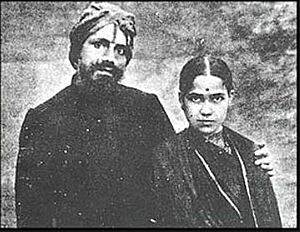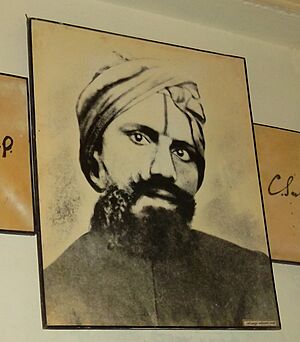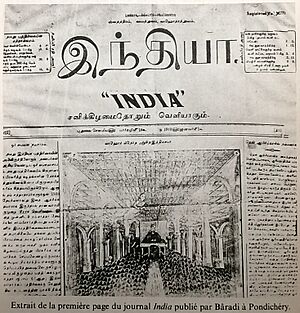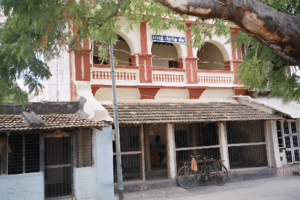Subramania Bharati facts for kids
Quick facts for kids
C. Subramania Bharati
|
|
|---|---|
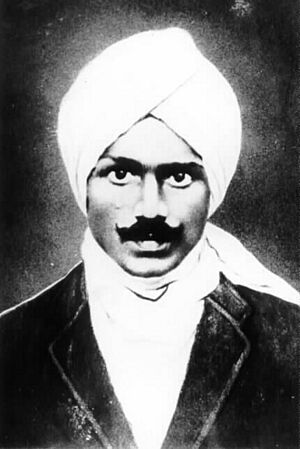
Subramania Bharati
|
|
| Born | 11 December 1882 Ettayapuram, Tirunelveli district, Madras Presidency, British India
(present-day Thoothukudi district, Tamil Nadu, India) |
| Died | 11 September 1921 (aged 38) |
| Other names | Bharatiyar, Subbaiah, Sakthi Dasan, Mahakavi, Mundasu Kavignar, Veera Kavi |
| Citizenship | Indian |
| Occupation |
|
| Movement | Indian independence movement |
| Spouse(s) | Chellamma (m. 1896–1921) |
| Children | 2 |
| Family | Rajkumar Bharathi (great-grandson) |
| Signature | |
C. Subramania Bharati (born C. Subramaniyan on December 11, 1882 – died September 11, 1921) was a famous Tamil writer, poet, and journalist. He was also an Indian independence activist and worked to make society better. People called him Bharati, which means "blessed by the goddess of learning."
Bharati was a pioneer of modern Tamil poetry. He is often called "Mahakavi Bharati," meaning "the great poet Bharati." His poems included many patriotic songs that helped inspire people during the Indian Independence movement. He strongly believed in equal rights for women and was against child marriage. He also spoke out against the caste system and wanted to reform society and religion.
He was born in Ettayapuram in 1882 and studied in Tirunelveli. He later lived in Varanasi, where he learned about Hindu beliefs and new languages. Bharati worked as a journalist for many newspapers like Swadesamitran and The Hindu. He saw Sister Nivedita, a student of Swami Vivekananda, as his teacher and inspiration.
In 1908, the British Government wanted to arrest Bharati. This made him live in Pondicherry, which was controlled by the French, for about ten years. He returned in 1918. A few months before he died, an Indian elephant he used to feed at a temple attacked him. He passed away on September 11, 1921.
Bharati knew many languages and loved Tamil deeply. His writings covered topics like politics, society, and spirituality. His songs and poems are still used in Tamil literature, music, and daily life. He was the first poet whose works were made public property by the government in 1949.
Contents
Early Life and Education
Subramaniyan was born into a Brahmin family on December 11, 1882. His birthplace was the village of Ettayapuram in Madras Presidency. His parents were Chinnaswami Iyer and Lakshmi Ammal. Sadly, his mother died when he was only five years old. After that, his father and grandmother raised him.
His father wanted him to learn English and Maths to become an engineer. But Subramaniyan loved music and poetry from a very young age. When he was about 11, he was given the title "Bharathi." This title means he was blessed by Saraswati, the goddess of learning, because of his amazing poetry skills.
In 1897, at the age of 15, he married Chellamma, who was seven years old. He lost his father when he was sixteen. After his father's death, he asked the Raja of Ettayapuram for financial help. Bharati worked in the Raja's court for a short time. Then he left that job and went to Varanasi. While in Varanasi, Bharati learned a lot about Hindu spirituality and nationalism. This experience broadened his views. He also learned Sanskrit, Hindi, and English. He even changed his look, growing a beard and wearing a turban.
Literary Work and Freedom Fight
Bharathi returned to Ettayapuram around 1901. He worked as the court poet for the Raja of Ettayapuram. From August to November 1904, he taught Tamil at Sethupathy High School in Madurai. During this time, Bharati realized how important it was to know about the world. He became very interested in journalism and newspapers.
In the same year, Bharati became an assistant editor at Swadesamitran, a Tamil newspaper. In December 1905, he went to a meeting of the Indian National Congress in Varanasi. On his way back, he met Sister Nivedita. She was a spiritual follower of Swami Vivekananda. She inspired Bharati to recognize the rights and importance of women. Bharati saw her as a form of the Hindu goddess Shakti and considered Nivedita his Guru (teacher). He later attended another Indian National Congress meeting in Calcutta. At this meeting, leaders demanded Swaraj (self-rule) and asked people to boycott British goods.
By April 1907, he started editing the Tamil weekly India. He also edited the English newspaper Bala Bharatham with M.P.T. Acharya. These newspapers became a way for Bharati to share his creative ideas. He continued to write poems in these publications. His writings covered many different topics. These included nationalism, thoughts about God and humans, and even the Russian and French Revolutions.
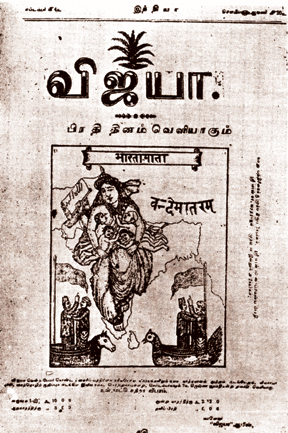
Bharati attended the Indian National Congress meeting in Surat in 1907. He went with V.O. Chidambaram Pillai and Mandayam Srinivachariar. This meeting showed deeper disagreements within the Congress. One group, led by Bal Gangadhar Tilak, preferred fighting for independence. Bharati, Chidambaram Pillai, and Varathachariyar supported this group. In 1908, the British started a legal case against Chidambaram Pillai. In the same year, the owner of the India journal, where Bharati wrote, was arrested. To avoid being arrested himself, Bharati escaped to Pondicherry. This city was under French rule at the time.
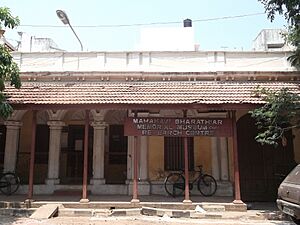
In Pondicherry, Bharati continued his work. He edited and published the weekly journal India. He also published a Tamil daily called Vijaya, an English monthly Bala Bharatham, and a local weekly Suryodayam. The British tried to stop Bharati's publications. The newspapers India and Vijaya were banned in British India in 1909. During his time in exile, Bharati met other leaders of the Indian Independence movement. These included Aurobindo, Lajpat Rai, and V. V. Subrahmanya Iyer. They had also sought safety under French rule. Bharati helped Aurobindo publish the journals Arya and Karma Yogi. He also started learning about Vedic literature. Three of his most famous works were written in 1912: Kuyil Pattu, Panjali Sabatham, and Kannan Pattu. He also translated Vedic hymns, Patanjali's Yoga Sutra, and the Bhagavat Gita into Tamil language.
When Bharati entered British India near Cuddalore in November 1918, he was arrested. He was held in the Central prison in Cuddalore for three weeks. He was released after Annie Besant and C.P. Ramaswamy Aiyar helped him. During this time, he faced poverty and poor health. The next year, Bharati met Gandhi for the first time. In 1920, he started editing Swadesamitran again from Madras.
Later Life and Death
Bharathi's time in prison affected his health. In 1920, a general pardon was given, which finally allowed him to travel freely. He gave his last speech at Karungalpalayam Library in Erode. The topic was "Man is Immortal."
He was injured by an Indian elephant named Lavanya at the Thiruvallikeni Parthasarathy Temple. He used to feed this elephant often. One day, when he fed the elephant a coconut, it attacked him. He survived the attack, but his health got worse. A few months later, he died early in the morning on September 11, 1921. Even though Bharati was a great poet and nationalist, only about 14 people attended his funeral.
Literary Contributions
Bharathi was one of the first people to create modern Tamil literature. He is known by the nickname "Mahakavi," which means "The Great Poet." Bharati used simple words and rhythms in his poems. This was different from older Tamil works, which had very complex language. He also introduced new ideas and writing styles in his poetry. He often used a poetic rhythm called Nondi Chindu in many of his works.
Bharati's poetry shared ideas about progress and social change. His poems were a new beginning for modern Tamil poetry in many ways. They mixed old and new styles. He wrote thousands of poems on many topics. These included Indian Nationalism, love, children, nature, the beauty of the Tamil language, and tributes to important freedom fighters. He fought for women's rights, against child marriage, and strongly opposed the caste system. He wanted to improve society and religion. His poems were the first in India to be made public property in 1949.
His famous works include Panjali Sabatham, Kannan Paatu, Kuyil Paatu, Paapa Paatu, Chinnanchriu Kiliye, and Vinayagar Nanmanimalai. He also translated Patanjali's Yoga Sutra and the Bhagavat Gita into Tamil. Besides these, he wrote many patriotic songs, religious verses, short stories, and translated speeches of leaders who wanted social change.
Legacy and Recognition
Bharathi spent his last years in a house in Thiruvallikeni in Chennai. The Government of Tamil Nadu bought and fixed up this house in 1993. It is now called "Bharathi Illam," meaning "Home of Bharathi." The house where he was born in Ettayapuram and the house where he lived in Puducherry are also kept as memorial homes. In Ettayapuram, his birthplace, there is a statue of Bharathi, a memorial complex, and a photo exhibit about his life.
In 1987, the Subramanyam Bharti Award was created to honor people who contribute to literature. This award is given every year by the Ministry of Human Resource Development of the Government of India. In 2021, the Government of Tamil Nadu started a yearly "Bharati young poet Award." Statues of Bharathi can be found in places like the Indian Parliament and on Marina Beach in Chennai. Roads are named after him, such as Bharathiar Road in Coimbatore and Subramaniam Bharti Marg in New Delhi. Many schools and colleges are also named after him. This includes Bharathiar University, a state university established in 1982 in Coimbatore.
See also
- Tamil Wikisource Subramaniya Bharathi's works
- Project Madurai Tamil literature repository
 | Aurelia Browder |
 | Nannie Helen Burroughs |
 | Michelle Alexander |


